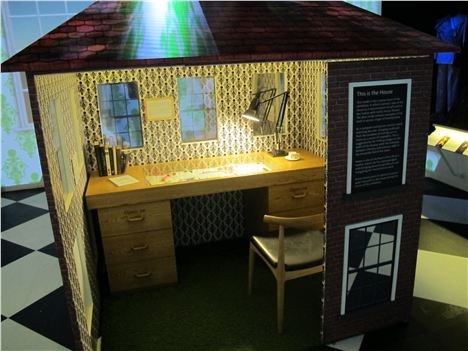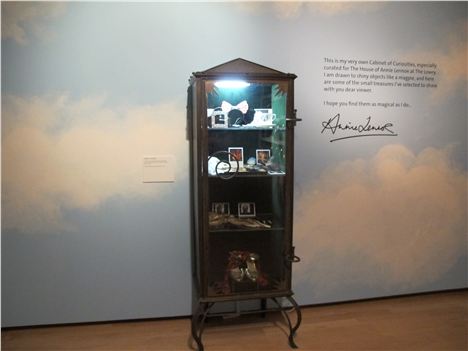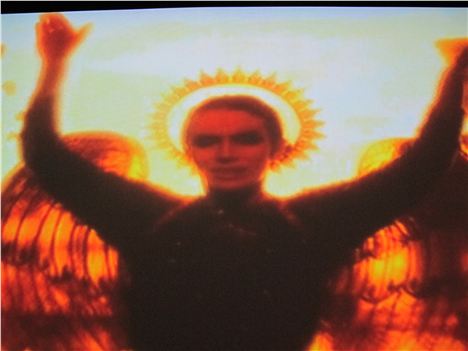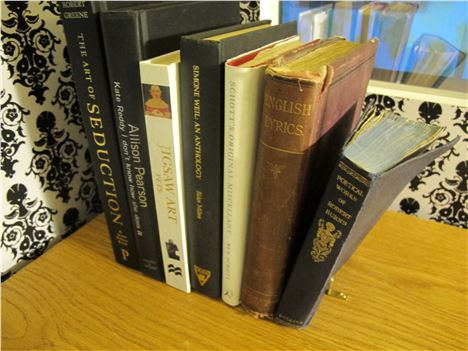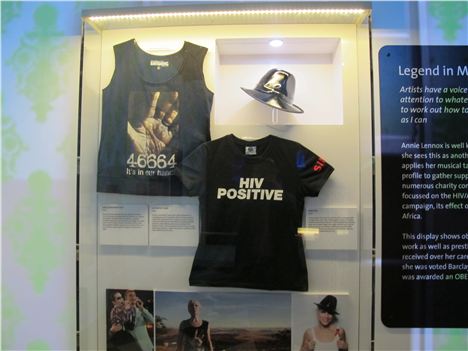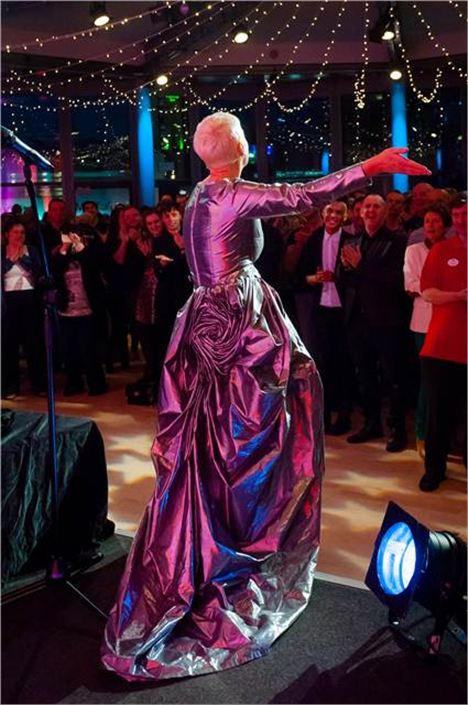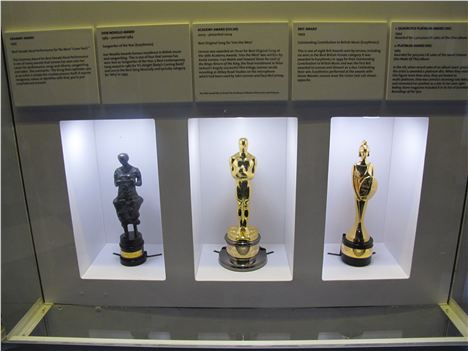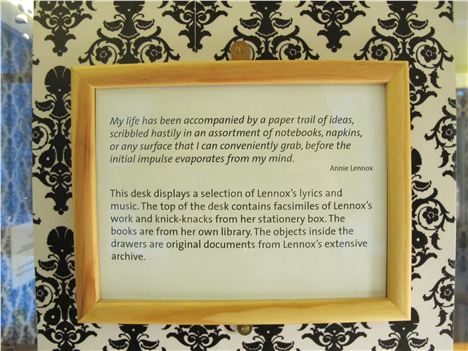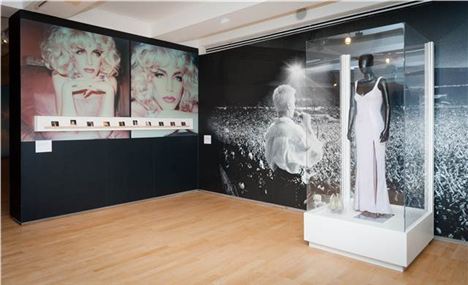ANNIE Lennox’s voice is not what I expect.
At one point I lose a question just letting the Scottish expressiveness flow over me smooth as a single malt. It’s a beguiling voice, a soft Aberdonian mist of gentle eloquence.
It's the timbre that catches you out. The words fall lightly, elfin-like. I feel I could be talking to a twenty-eight year old not a fifty-seven year old. There’s none of the power and force you get from Lennox's singing voice, none of the deepening you expect from the passing years.
"Becoming an artist," says Lennox, "is a strange feeling, it doesn’t come from being a happy bunny. Artistic expression comes from feeling the grit in your shoe."
We’re talking because the Eurythmics star, UNESCO ambassador, artist, fashionista and feminist has a Lowry extravaganza.
Called the House of Annie Lennox, it explores the ‘music, image and vision of one of the most successful female artists in UK music history’.
This means that Lennox has grabbed a good part of The Lowry and filled it with collections of ephemera, clothes, gold discs, videos, documentary and artworks.
Walking through the exhibition rooms is strange, parts look like Affleck’s Palace, parts like a record company’s walls filled with gold discs, parts like an avant-garde boutique, and parts like an old-fashioned gallery exhibition.
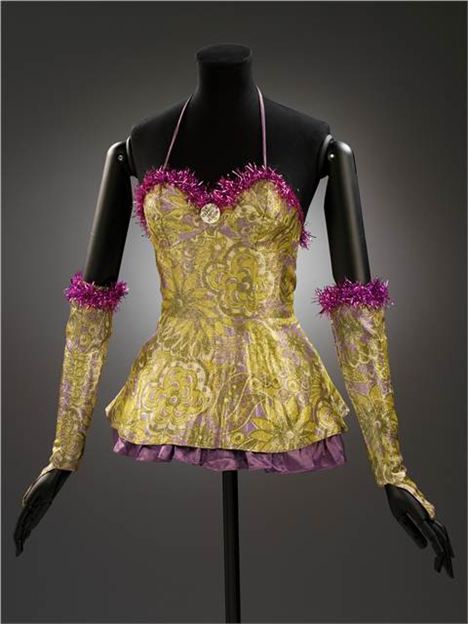 Annie Lennox costume - courtesy of Annie Lennox images
Annie Lennox costume - courtesy of Annie Lennox images
“So how did the exhibition come about?” I ask Lennox.
“Over the years I’ve accumulated things that have some meaning to me,” she says. “It could have been costumes I was wearing, anything.
"When I was a kid we didn’t have a lot of material things, we lived in a tenement house, but I still loved to keep things. In Aberdeen the sky matches the grey stone so I think I was fascinated by anything that was colourful and shiny; pencils, crayons, beads. I’ve always loved flea-markets and junk stores. I’ve got lots of little things, fascinating ephemera - worthless I suppose. I’m the sort of person who if somebody sends me a present and I like the wrapping paper I can’t let go. It’s kind of an old fashioned thing, it used to be called thrift.
Or even ‘Scottish’ I think in a music hall way that flies unbidden into my head.
“You’re a hoarder then,” I say instead.
“Not really a hoarder,” says Lennox. “I just have lots of things, including lots of awards. At one point it was in storage and there was a flood. I thought I’m not taking care of this stuff I must record it. So I archived it and I photographed it all in case it got destroyed. But I also had my website and I thought this would make fantastic content. Following from that came the idea that I’d like to share it with people and make some installation. A friend said why don’t you contact the V&A, they have a department of theatre and performance? They came over and they said we’d love to work with you. That was three years ago.”
Lennox could be guilty of self-obsession here.
We could all make exhibitions of our lives, with all the bits and pieces we've accreted over the years.
But as I’m thinking that, I realise Lennox is a woman accustomed to real fame. She's therefore different. She will have experienced the cultish weirdness of fandom where any holy relic of the star is cherished by the acolytes. She knows some people will want to stare at her buttons.
And in any case all artists are self-obsessed, it goes with the territory.
Still I can't help asking: "But because of your fame, success, the strength of your opinions, the V&A would have always wanted to work with you - given who you are, worth a headline or two?”
“It was what we could achieve I rather think,” she gently trills, dismissing the idea. “It was whether we could create something worthwhile.”
I give up on that line of questioning, probably too quickly. But I tell you people, that voice....
Instead we talk about where the ideas for the exhibition come from.
“They come from my imagination, my dear,” says Lennox with a laugh like water in a mountain stream. “Ideas come like flashes. Artistic people like to immerse themselves in things that are inspiring to them. I love to look at things from shells to flowers to buildings.
"I used to visit an ethnological museum in Aberdeen because there wasn’t much to do and that was the type of child I was. I loved the glass display cabinets.
"After the V&A when I was preparing for The Lowry I realised I had this broken cabinet lying on its back, like some broken redundant creature. Yet it was something magical. I remembered the cabinets in Aberdeen and the cabinet of curiosities tradition. Perfect I thought. I suppose I just find what’s around me in the visual world very interesting. And if I look at a piece of work I’ve done, or a photograph - I can’t analyse the process - but I know what works and what I’m trying to say, and what the symbology is, and the reference points.”
Back to the self-obsession point, there’s a lot of 'me, myself, I' in Lennox's words. “Are you hard to work with?” I say, the name of her first solo-album Diva in mind.
“I definitely have strong opinions,” is the response. “If I work with someone who can be a strong feedback person for me, if I can trust them, and know they have the same kind of inner eye as me then that’s the dream team. When I worked for Sophie Muller making videos I trusted her eye and she knew the way I looked at things. It was a beautiful thing working like that intuitively, as artists.”
The use of the word 'artist' only ever seems three sentences away in any conversation with Lennox. I ask her about this.
"Becoming an artist," says Lennox, "is a strange feeling, it doesn’t come from being a happy bunny. Artistic expression comes from feeling the grit in your shoe. You have to express yourself, you have to create. This can be a very painful process. It can be self-destructive. Artists are very fragile people, wilful, egotistical. The monster they create can bite them."
Annie Lennox, despite her voice, does not sound in the least fragile, although she may have some of the other characteristics.
"There’s not a formula to being an artist, it’s on your own terms," she says. "And I'm not blind to how you become a success. Music is about about selling records for instance, it's about a critical judgement, looking over your shoulder and asking am I cutting it in the public eye. You can be a victim of people adoring you or loving you. Believe in what people are saying."
What about the other side of things? What about criticism, the UK is renowned for being rough to people who've made it? In fact it's one of our endearing qualities, who'd want the hysteria of the reaction to Whitney Houston's death in the US?
"Britain has its own quirks. A lot of people feel defined by a class so there are feelings of superiority or inferiority."
So is Annie Lennox defined by class?
"Class is definitely part of me," she says, pausing to think for a minute. "One side of my family is socialist and working class, but on the other side was my grandfather who was a gamekeeper for the wealthy – and he never felt like there was need to change the system. A split idea. I didn’t think there was anything in that and I had a dream as I was growing up anyway."
Turns out little Annie Lennox's dream was of escape. Read the cuttings and they talk of an over-protective father and feeling caged.
"There was a need to get to a place where I could express myself. When that starts to happen it’s exquisite in a way. So I left home. I remember the excitement in London when I had no money. Those dreams you think you are going to....," she trails off for a second, before re-engineering the thought. "I was trying to find whatever was authentically me, ethereal or whimsical or thrash or whatever."
"Getting older is a process," she continues, "music was everything to begin with. I knew pop music backwards because everybody did. I loved Motown and I was drawn to it, in a very visceral way. I wanted to go out and enjoy it, meet boys and dance and stay up late. Then came success. With that you can travel - I’ve been to every major city across the States, many many cities across the world - and that’s an experiential thing. You learn empathy. Travel has been my golden ticket to understanding."
Particularly about understanding politics it seems.
Annie Lennox is a feminist who has campaigned on human rights, AIDs, poverty and many other causes throughout her adult life. She's also a philanthropist, giving a great deal to charity.
"Seeing the world shows you things at a deeper level," she says. "Good and bad. Sometimes you feel that the injustice in the world can be overwhelming. You read about the cruelities on a daily basis. So I thought is there anything I can do? I don’t mean for fame's sake but is there something of value I can contribute."
At the core of this Lennox sees the inequality between men and women.
"I’m for the empowerment of women," she says, "and this is nothing to do with disparaging men, feminism is a wholly positive notion, let’s re-define it for young men and women. It's also part of the key to human rights failures across the world.
"It’s bad enough in the developed countries with boardroom and employment inequalities and low paid jobs," Lennox continues. "But in developing countries women often haven’t even got to the very bottom rung of the ladder. There are very very few rights, there's gender violence, domestic violence and a lack of representation. There is a lot that has to change, here and over there."
The melody in Lennox's voice is now a little strained.
"Did you ever think of becoming a politician?" I say thinking of her UNESCO work, the Amnesty International campaigning, the fierce attack on the Roman Catholic Church's official line on HIV prevention in Africa.
"I would never to be a politician, never," she says this time almost fiercely. "I’m an artist. I can articulate the problem. I'm not interested in joining a party. I need to be autonomous, and speak my conscience. The way I see it is I can use my role to articulate ideas outside the political framework."
We finish the interview back with the exhibition. The V&A caught the bug for shows - yes shows, rather than exhibitions - about celebrities with the Kylie moment back in 2007 - click here. Of course Lennox's work attempts to go much further than the Minogue's fashion focus, she was more involved for one thing, but her celebrity is still key to its formation.
“Annie shouldn’t you be dead to do this?” I ask. “The exhibition feels like a full-stop, an endgame, rounding off a life’s work. A retrospective. Something you might get post mortem.”
“It couldn’t be further from that,” she says, back to charm with a delightful laugh in her voice. “It’s one of the most wonderful things that’s ever happened to me. An arrival point. For the first time I’ve been given free rein to bring together musics, visuals, concepts. I’ve never been an obsessive muso, I’ve always wanted to be part of a mixing together of visual and conceptual art and documentary art. Being in a position to make this happen first at the V&A and now at The Lowry feels very right to me. I was never fully defined wearing one hat.”
“But isn’t it very naked?” I ask. "You're allowing people to crawl around inside your head?”
“There’s nothing naked about this,” she disagrees with smooth force. “The show is not about me domestically, it’s about the way I look on life. The things you see are the tools I’ve used throughout my creative journey, my tools of communication, tools of connection, music, pictures, films and so on. It’s not about me privately, I will never be in Hello talking about my personal life.”
“Why not?” I say with a laugh.
“It would be cheap. This is about showing people what’s outside the head not allowing people inside, it’s about helping show people a new reality, it’s fascinating.”
Finally I say, “God I fancied you as a lad of twenty, it was the quality of your eyes, the skin, the cheekbones, that did it for me. There was an androgynene oddness there that slightly perturbed a Rochdalian boy, but the songs, the way you moved and those eyes....”
I'm lying.
Of course I didn’t say that to Annie Lennox.
Maybe I should have.
But either way I can't escape the human condition of wanting to put people into neat boxes, catalogue them in my own cabinet of curiosities.
Lennox to me is a singer songwriter. The rest is thinner, not as substantial.
The danger of being polymath is you can lose focus.
Lennox's flighty exhibition can be like that. It occasionally falls into whimsy, you feel the fact of Annie's fame drowning the art.
Proof came at the launch in Salford when Lennox did a short but perfect gig - her alone, the Diva at the piano. That's when she made perfect sense. The voice was no longer elfin as it had been in the interview. It was a cry from the heart, all power and energy, all consuming.
During the songs I kept getting a picture of her as a teenager in her small tenement in her grey city looking at some bright wrapping paper and feeling the grit in her shoe.
So, unlike the exhibition, as any good interviewer, should did I get into Annie Lennox's head?
Not for a second I think.
Lennox is charm personified, superb at that human touch that only the biggest and sanest celebs achieve. "Oh, how interesting!" she exclaims when after she'd talked of her socialist background I describe Karl Marx and Friedrich Engels' links to Manchester. And I can tell that she means it.
But there was a still point that couldn't be reached within Lennox. An element of the arm's-length treatment. Then again the woman is famous for dressing up in a thousand costumes under a thousand wigs. She likes a disguise.
"I had a piano teacher, Mrs Murray, very old-fashioned, very grand. I remember her telling me to practise harder if I didn't want to be the laughing stock of Scotland," Lennox informs the Lowry audience.
She practised harder. She’s no laughing stock. She’s achieved. She has a voice that extends beyond music into activism. From the interview experience she comes across as passionate and kind.
But whether this exhibition adds anything to the myth and reality of Annie Lennox is less certain.
The House of Annie Lennox is at The Lowry until 12 June 2012. Free. Open every day. The Lowry is at Pier 8 Salford Quays M50 3AZ.
0843 208 6000








